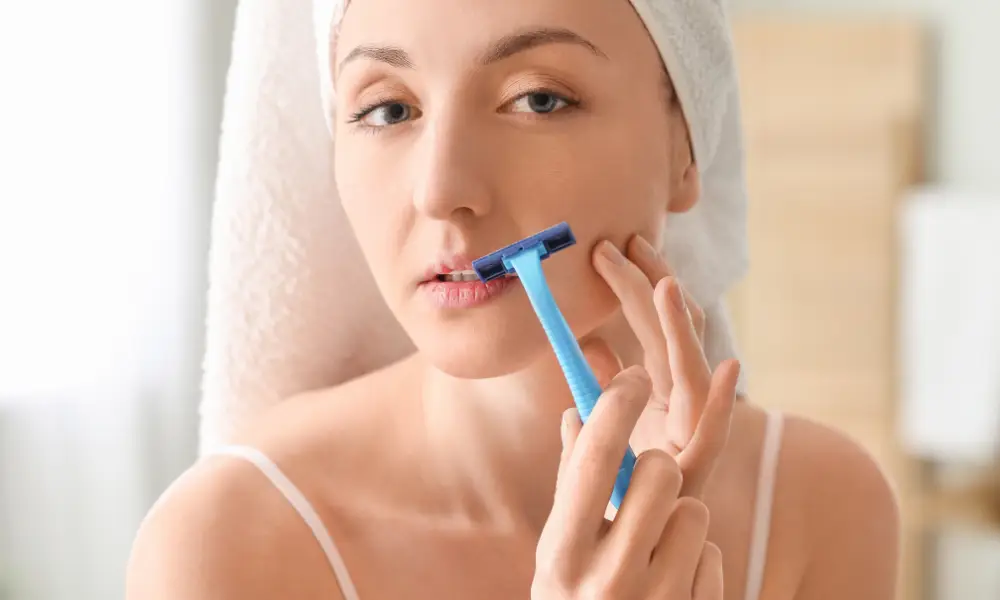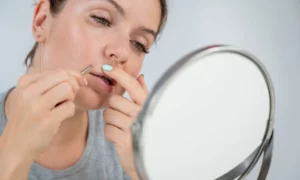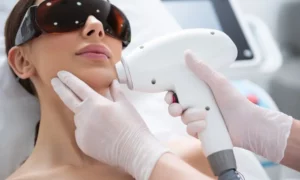Polycystic Ovary Syndrome (PCOS) is a prevalent health condition affecting many individuals, particularly women of reproductive age. One of the notable symptoms associated with PCOS is hirsutism, the excessive growth of facial and body hair. In this comprehensive guide, we will talk about the intricacies of PCOS hirsutism and explore various approaches, innovative solutions and more.
Contents
Importance Of Addressing PCOS-Related Hirsutism 
Addressing hirsutism related to Polycystic Ovary Syndrome (PCOS) is important for several reasons. Hirsutism refers to the excessive and unwanted growth of coarse, dark hair in areas where men typically grow hair, such as the face, chest, and back. Here are some key reasons highlighting the importance of addressing PCOS-related hirsutism:
- Psychological Impact
Experiencing visible signs of excess hair growth may lead to feelings of self-consciousness, and reduced self-esteem. Addressing hirsutism can contribute to improved mental well-being and body image.
- Quality of Life
The social and emotional distress associated with hirsutism can impact daily activities, relationships, and the ability to fully participate in social settings. Effective management can enhance overall quality of life.
- Relationships and Intimacy
The emotional toll of hirsutism may extend to intimate relationships. Addressing this aspect of PCOS can positively influence personal relationships, fostering improved communication and intimacy.
- Preventing Secondary Issues
Managing hirsutism effectively can help individuals reduce the need for frequent hair removal and prevent potential complications.
- Social and Professional Impact
Visible signs of hirsutism can influence social interactions and may potentially impact professional settings.
- Individual Well-Being
Overall well-being is closely tied to how individuals perceive and feel about their bodies. By addressing hirsutism, individuals with PCOS can work towards achieving a more positive and accepting relationship with their bodies, promoting overall well-being.
- Treatment of Underlying Cause
Hirsutism is often a result of elevated androgen levels, a common feature of PCOS. Addressing hirsutism may involve managing the underlying hormonal imbalances associated with PCOS, which can have broader health benefits.
- Personal Empowerment
Taking steps to address hirsutism empowers individuals to actively manage their PCOS symptoms. This sense of control over one’s health can positively impact the overall journey of living with PCOS.
Treatment Approaches For Hirsutism
The treatment of hirsutism related to Polycystic Ovary Syndrome (PCOS) involves a combination of approaches aimed at managing excessive hair growth and addressing the underlying hormonal imbalances. Here are common treatment approaches for PCOS-related hirsutism:
- Hormonal Therapy
Oral Contraceptives: Combination birth control pills containing estrogen and progestin help regulate menstrual cycles and reduce androgen levels, leading to a gradual improvement in hirsutism.
Anti-Androgen Medications: Medications such as spironolactone may be prescribed to block the effects of androgens, reducing excess hair growth.
- Topical Treatments
Eflornithine Cream: This prescription cream slows down the rate of hair growth and is applied directly to affected areas. It is often used in conjunction with other treatments.
- Hair Removal Methods
Shaving: A simple and temporary method to remove hair, although it does not affect the thickness or growth rate.
Waxing: Removes hair from the root, providing longer-lasting results compared to shaving.
Laser Hair Removal: A medical procedure that uses laser light to damage hair follicles, reducing hair growth. Multiple sessions may be required.
- Electrolysis
A method that uses electric currents to destroy individual hair follicles, offering a permanent solution for hair removal.
- Weight Management
Achieving and maintaining a healthy weight can help improve hormonal balance and reduce hirsutism in some cases.
- Insulin-Sensitizing Medications
Medications such as metformin may be prescribed to improve insulin sensitivity, which can help manage hormonal imbalances associated with PCOS and, consequently, hirsutism.
- Nutritional Supplements
Inositol and vitamin D supplements may be recommended to address nutritional deficiencies and support overall health.
- Lifestyle Modifications
Adopting a low-glycemic diet rich in whole foods and engaging in regular physical activity can help manage insulin resistance and improve hormonal balance.
It’s important to note that the choice of treatment depends on individual factors such as the severity of hirsutism, overall health, and personal preferences.
Innovative Approaches To Manage Hirsutism 
In addition to traditional treatments, innovative approaches are continually emerging in the management of hirsutism. While these approaches may not replace established medical interventions, they can offer new avenues for addressing the condition. It’s important to note that the effectiveness of innovative approaches may vary, and their use should be discussed with a healthcare professional.
Here are some innovative approaches to managing hirsutism:
Laser Therapy and Light-Based Treatments
- Laser Hair Removal: Laser technology targets the melanin in hair follicles, leading to their destruction and a reduction in hair growth. This is a common and effective method for semi-permanent hair removal.
- Intense Pulsed Light (IPL): IPL devices use broad-spectrum light to target and damage hair follicles, reducing hair growth. IPL may be used as an alternative to laser therapy.
Prescription Topical Creams
- Eflornithine Cream: Eflornithine is a topical prescription cream that inhibits an enzyme involved in hair growth. It is applied directly to affected areas and can slow down the rate of hair growth.
Platelet-Rich Plasma (PRP) Therapy
PRP therapy involves extracting a small amount of the patient’s blood, processing it to concentrate platelets, and injecting the PRP into the treatment area. While primarily used in aesthetic medicine, some studies explore its potential in hair reduction.
Electrolysis Innovations
Thermolysis and Blend Techniques: Electrolysis, a method of permanent hair removal, has seen advancements in techniques such as thermolysis and blend, improving precision and efficacy.
Microneedling
Microneedling involves the use of a device with fine needles to create tiny punctures in the skin. Some studies explore the potential of microneedling in reducing hair growth when combined with other treatments.
While these innovative approaches show promise, it’s crucial to approach them with a cautious and evidence-based mindset.
Maintaining A Positive Mindset 
- Importance of Self-Love and Acceptance
Cultivating self-love and acceptance is fundamental in the journey to managing hirsutism. Embracing one’s uniqueness and understanding that beauty goes beyond societal norms contribute to a positive mindset.
- Building Confidence While Dealing With Hirsutism
Building confidence involves recognizing personal strengths and achievements. Small victories in managing hirsutism, whether through lifestyle changes or treatment options, contribute to an overall sense of well-being.
Conclusion
In conclusion, addressing PCOS-related hirsutism requires a multifaceted approach that combines traditional treatments, lifestyle modifications, and innovative solutions. By understanding the impact of hirsutism, exploring various options, and fostering a positive mindset, individuals can navigate this journey with confidence and well-being.
If you are facing PCOS related issues, PCOS treatment at HerMantra can help. Book your free trial online pcos treatment session now.





